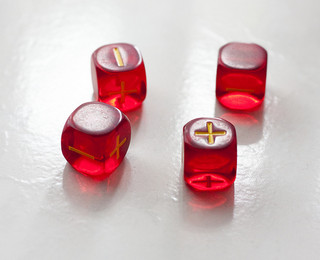 The ABCs of GMing
The ABCs of GMing
The ABCs of GMing is an ongoing series about the different skills and ideas needed to run a successful tabletop game.
Generosity
There is a subset of GMs that feel a need to be competitive whenever they run a tabletop campaign. This group views the art as a master scheme to thwart or destroy player characters on a weekly basis. Inherently, these GMs play everything by the book. Players will get exactly as many experience points, gold pieces, and loot that the monster listing in the bestiary states. Nothing more, nothing less. Are you 12 XP short of gaining a level? Sorry, you’ll have to wait for one more encounter. Need 100 more gold to get your weapon enchanted? You’ll have to pawn something else off, or try your luck with your profession skill. By. The. Book.
GMing doesn’t need to be that rigid. Think of the situation your players are in. If a GM is that stingy and a stickler for the rules, the players end up feeling like they are always playing against the game, rather than the story. Frustrations can build based solely on the text from a source book, and any experienced tabletop player will inform you that sometimes what’s in the book is not the best solution for the game. To that end, this week we take a look at Generosity. It’s important to give your players more than merely what your source books will tell you, and there are a variety of reasons – all valid – to be benevolent to your players.
Creativity
As GMs, let’s be honest for a minute and accept the fact that we cannot predict what our players will do. No matter how much planning is done, players will always do something unexpected. I’ve personally lost count of how many times I’ve spent hours working on one single encounter, making antagonist characters from scratch, designing combat areas, and doing everything in my power to plan for every conceivable thing my wacky and sometimes ludicrous players may do to foil my “master evil plans” as the GM. Nearly every time, without fail, my players will dream up the most absurd solutions to a problem and find a way to eliminate all my hard work in one round. While the immediate response is often frustration and disbelief, I eventually applaud my players for being innovative and thinking of something I never would have. In these situations, I hand out more experience or loot as a reward for thinking outside the box and giving me yet another variable to consider the next time I plan an encounter (as the same trick should never work twice).
Development
The example above is experienced more commonly with veteran tabletop players. But everyone has to start somewhere, and playing a tabletop game requires a developed way of thinking and an understanding of the core rule concepts.
For newer players, thinking outside of said box is easier said than done. New players are still trying to explore the basic mechanics of the game you are playing, let alone trying to figure out a good way to work around them. Like any good friend, the GM should help newer players get accustomed to the trivialities of table top RPGs and the nuances that come with them. If you see a novice player getting the hang of the system and successfully making a leap of progress, give them something extra as a reward. It may not be anything amazing or spectacular, but it’s something worth fostering. Your other players should recognize what you’re doing, and likely won’t be quick to judge for handing out a freebie to the noob.
Just Enough
In the article on Dedication, I covered the notion that you should be spending more time on the game than your players. An extension of this is also knowing how much time your players are spending on the game, as well as keeping yourself informed on what plans they have for their characters. Every few sessions, spend some time talking with your players to get an idea of what plans they have for experience points, classes, gear upgrades, etc. Having this knowledge allows you to be generous when they need it most. If a player in your party ends up just a few XP or gold short of a major upgrade at the end of an encounter, just tack on a bit more for everyone. That way, your player isn’t left anxious about being that close and yet just out of reach. This especially holds true if you know that your players will need that extra boost for your next (and presumably more difficult) encounter. There’s nothing wrong with adding a tiny bit more to the top now and then to help them enjoy the game and keep their characters from getting killed.
Non-Tangible Returns
Finally, help your characters in ways they don’t know! While player character death is always a risk, the last thing you want is a poorly timed one. If your roll is a bit high and might take someone down for good, you can do the unspoken thing most GMs do: fudge a few numbers off to give them a chance to survive.
While player character death is suitable for many situations, it shouldn’t be for all. Poorly timed deaths can demoralize a player and may lead to someone leaving the group.
Next time, I’ll be talking about Hard Work and expand more upon our earlier segment on Dedication. In the meantime, feel free to tell us about your own tales of generosity on our social media pages!
Photo Credits: Young dress-up player by Dave Bledsoe; Fudge Dice by Paul Weimer.


